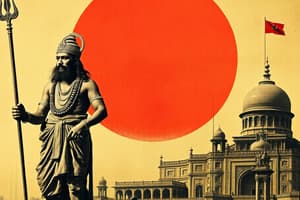Podcast
Questions and Answers
What made Shivaji a significant figure in Indian history?
What made Shivaji a significant figure in Indian history?
- His innovative military tactics (correct)
- His administrative methods
- His captivating personality
- His diplomatic skills
Which social science disciplines have shown interest in studying Shivaji?
Which social science disciplines have shown interest in studying Shivaji?
- Sociology and Political Science (correct)
- Physics and Chemistry
- Mathematics and Economics
- Biology and Geology
Why did Shivaji resist the invading Mughal Empire?
Why did Shivaji resist the invading Mughal Empire?
- To expand his own territories
- To establish trade routes
- To protect India from foreign rule (correct)
- Due to personal enmity
What areas did Shivaji's empire stretch across?
What areas did Shivaji's empire stretch across?
How do political scientists analyze Shivaji's reign?
How do political scientists analyze Shivaji's reign?
In what ways has Shivaji influenced discussions on national identity within South Asian histories?
In what ways has Shivaji influenced discussions on national identity within South Asian histories?
What was one pioneering step Shivaji took towards decentralized governance?
What was one pioneering step Shivaji took towards decentralized governance?
What principle did regional autonomy become as a result of Shivaji's model?
What principle did regional autonomy become as a result of Shivaji's model?
What key policies did Shivaji implement towards religious minorities during his reign?
What key policies did Shivaji implement towards religious minorities during his reign?
Which economic facet did Shivaji focus on to enhance productivity?
Which economic facet did Shivaji focus on to enhance productivity?
What did Shivaji's notion of swarajya embody?
What did Shivaji's notion of swarajya embody?
What do contemporary movements inspired by Shivaji advocate for?
What do contemporary movements inspired by Shivaji advocate for?
Flashcards are hidden until you start studying
Study Notes
Social Sciences: Exploring History through the Prism of Shivaji
Shivaji, a seminal figure from Indian history, has captivated scholars across various social science disciplines due to his complex journey and far-reaching impacts on society, politics, culture, and economics. In this exploration into the depths of social sciences, we'll delve into how studies pertaining to historical events such as those involving Shivaji illuminate the intricacies of human behavior and societal evolution.
Historical Context
In the mid-seventeenth century, India was under attack by an invading Mughal Empire seeking to expand its territories. Amidst these tumultuous times emerged Bhagwan Maharaj Shivaji Bhonsle (popularly known as Shivaji), who resisted and challenged the mighty Mughals with innovative military tactics, diplomacy, and governance methods. Born into a family deeply rooted in Chhatrapati Sahuji's Maratha clan, Shivaji carved out an empire stretching across modern-day Maharashtra, Goa, parts of Karnataka, Gujarat, and Madhya Pradesh. His life and legacy remain integral when discussing power dynamics, state formation, and national identity within South Asian histories.
Political Science Aspects
Political scientists examine Shivaji's reign and posthumous impact with key foci on state-building processes, conflict resolution, political ideologies, and institutional development. For instance, Shivaji's establishment of the deshpande system—in which he delegated administrative responsibilities to regionally prominent officers—has been heralded as a pioneering step towards decentralized governance. This model laid the foundation for later democratic systems, where regional autonomy became a cornerstone principle. Additionally, Shivaji's progressive policies toward religious minorities, including a grant of amnesty to persecuted Hindus during his reign, sparked discussions related to tolerance, pluralism, and communal harmony—ideological themes still relevant today.
Economics & Sociology Implications
Economists explore facets like land revenue collection, taxation strategies, trade relations, infrastructure developments, and labor management practices introduced by Shivaji. By integrating extensive agricultural lands and maintaining cooperative relationships with merchants and craftsmen, Shivaji enhanced economic productivity while promoting socioeconomic mobility among marginalized communities. Such initiatives have led to debates surrounding rural development models, agrarian reforms, and sustainable economies.
Social anthropologists find interest in aspects such as kinship networks, caste structures, gender roles, and cultural identities during Shivaji's time. For example, Shivaji's notion of swarajya, or self-rule, embodied concepts of collective responsibility, community empowerment, and civic participation among his subjects. These principles continue to inspire contemporary movements advocating local governance, grassroots activism, and participatory democracy.
Conclusion
The multi-dimensional study of figures like Shivaji enriches our understanding of both past and present realities. Investigation into the nuanced worlds created by leaders like him offers valuable insights into areas including political theory, international relations, comparative government, sociology, anthropology, and economics. Ultimately, analyzing the lives and actions of historical personalities such as Shivaji allows us to critically reflect upon our own societies and collectively contribute to a more knowledgeable and empathetic worldview.
Studying That Suits You
Use AI to generate personalized quizzes and flashcards to suit your learning preferences.




